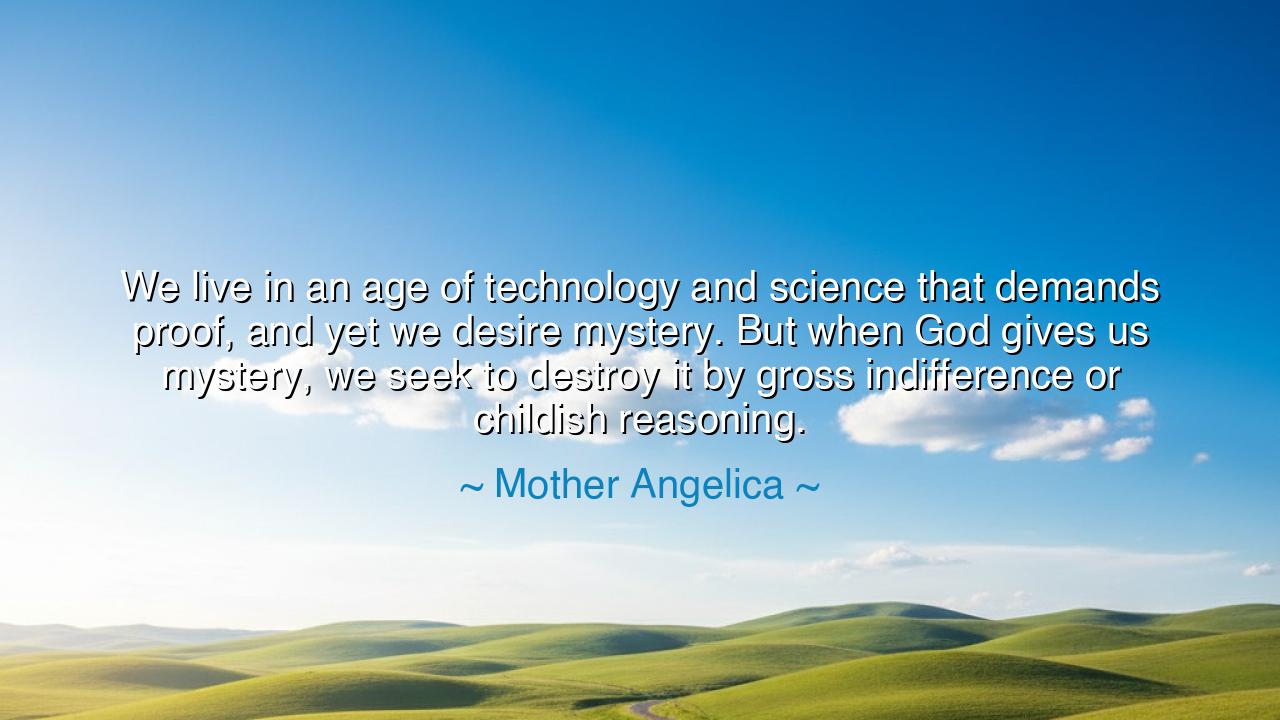
We live in an age of technology and science that demands proof
We live in an age of technology and science that demands proof, and yet we desire mystery. But when God gives us mystery, we seek to destroy it by gross indifference or childish reasoning.






In the quiet solitude of our hearts, where the echoes of ancient wisdom still whisper, we find ourselves in a great paradox. We stand at the threshold of an age dominated by science and technology, an age that demands proof at every turn. And yet, deep within the chambers of our souls, there is a longing—an eternal yearning—for the mystery of life, for the unknown that lies beyond the grasp of our understanding. Mother Angelica, a beacon of wisdom and faith, spoke of this paradox when she said: “We live in an age of technology and science that demands proof, and yet we desire mystery. But when God gives us mystery, we seek to destroy it by gross indifference or childish reasoning.” These words ring with the weight of truth, for they touch upon the very essence of our modern dilemma.
Science has brought us to great heights. It has unlocked the secrets of the heavens, peeled back the layers of the earth, and unveiled the intricate wonders of the human body. Yet, in our pursuit of knowledge, we have become like the proverbial child who, having unwrapped a beautiful gift, grows bored with it almost immediately. We demand proof for every mystery, every question, as though the sacred truths of existence could be neatly tied up and delivered in the cold, clinical language of facts and data. The very act of questioning, of seeking, has become less about the pursuit of truth and more about satisfying our need for certainty, for control.
And yet, even as we chase the light of knowledge, we find ourselves yearning for something greater. We crave the mystery that lies just beyond our reach, the ineffable, the divine. It is a longing as old as time itself—the desire to glimpse the face of the unknown, to feel the presence of the divine in the midst of our finite understanding. But as Mother Angelica wisely points out, when God bestows upon us the gift of mystery, we do not receive it with reverence or awe. Instead, we attempt to unravel it with the reckless hands of indifference or the childish simplicity of our own reasoning.
This struggle between faith and reason, between the known and the unknown, is not a new one. The ancient Greeks knew this well. Socrates, the great philosopher, understood that true wisdom lies not in the accumulation of facts, but in the acceptance of the limits of human understanding. He often spoke of the mysteries of the universe, encouraging his followers to seek knowledge, not for its own sake, but to understand the greater truths of existence. Yet, even Socrates knew that some truths were beyond the grasp of mere logic. There are mysteries that cannot be solved, questions that cannot be answered, and it is in the acceptance of these mysteries that we find the true peace of the spirit.
Consider the story of Albert Einstein, the master of modern physics, who unlocked the secrets of the universe with his theory of relativity. Yet, despite his monumental discoveries, Einstein was not a man who believed everything could be explained through science. He often spoke of the “mystery” of the universe, acknowledging that there were aspects of life and existence that could never be understood by the human mind alone. Einstein did not seek to destroy the mystery, as many might, but rather embraced it as a testament to the grandeur of creation, a reminder that there is always more to learn, more to explore, and more to love.
In this way, Mother Angelica’s words remind us of a profound lesson: The mystery of life, of creation, is not something to be feared or destroyed, but something to be cherished. We must resist the urge to reduce the sacred to the rational, to strip away the divine by our indifference or the arrogance of our own understanding. Instead, we must learn to revere the mystery, to approach it with humility and a sense of awe. For in the mystery, we find the beauty of life itself—the unexplainable, the ungraspable, the divine presence that fills the space between the known and the unknown.
The lesson we must carry forward is this: In our search for knowledge, we must not allow the quest for proof to blind us to the greater truths that lie beyond reason. We must hold space for the mystery of life, and in doing so, cultivate a spirit of wonder and humility. Let us not seek to unravel every secret, for some things are meant to remain veiled, to stir our imagination, to deepen our faith, and to connect us to the divine. In a world that demands answers, let us remember that there is a sacred power in embracing the unknown. May we always honor the mystery that surrounds us, and in doing so, draw closer to the heart of creation itself.






AAdministratorAdministrator
Welcome, honored guests. Please leave a comment, we will respond soon